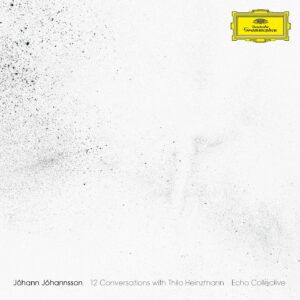12 Conversations with Thilo Heinzmann, a new release from Deutsche Grammophon, is best listened to on vinyl (it’s available in that format!) in a fashionable, faux-derelict loft apartment in Soho, London, or Berlin. Thick beard, suspenders, horn rimmed glasses, woolen vest, and ironic T-shirt—pork pie hat optional, but recommended. This would fit to a T the pretentiousness of the liner notes to film-maker and film-music composer Jóhann Jóhannsson’s latest and last composition (before he offed himself with an overdose of cocaine).
If it weren’t for the liner notes, 12 Conversations with Thilo Heinzmann would simply be a 12-movement, post-minimalist string quartet of modest if inoffensive quality. Fortunately, said notes tell us an elaborate story of an English millionaire art-collector, his favorite German painter (Thilo Heinzmann), and the Icelandic composer Jóhann Jóhannsson being brought together by a quest to discover whether it is possible to “create a work that is the genuine collaboration between a composer and a painter”. For good measure, if irrelevantly, the Pet Shop Boys make a cameo. Subsequently Jóhannsson proceeded to hang one of Heinzmann’s pictures in his studio and got to work. The picture, by the way, is called “Without Title, 2011”, a white canvas with speckles of India ink—and you get the painting on the cover of the CD or LP.
Of course, that’s really not that novel a thing to do. The Berlin-based composer Walter Steffens has been doing this for years and to much more intriguing results. (Take a listen to his viola concerto, Guernica.) Granted, the liner notes assure us that this collaboration went well beyond that, in that the artists and philanthropist would meet, 11-plus times over the four years of composition. And at those meetings they had conversations about matters conceptual, political, and—gasp!—deeply personal. This resulted in “an emotional record of the friendship that grew up [sic] between the three of us.” There’s another unique concept—or at least it was, when Elgar composed his Nimrod Variation. To further the work’s pretentions, it is then categorized as a plea for a continued commitment to the “European Project”, what with people from different nationalities having been involved. I’ll stop here before I spoil you any insights from the next five pages.
You’ll be happy to know that the music is more concisely described than the written garnish. Jóhannsson’s music sounds like the common denominator of Philip Glass, Max Richter, and Brian Eno. Ambient-minimalist, with Jóhannsson’s background in electronic music audible, but those elements here given to a string quartet to perform. The Belgian string quartet Echo Collective plays the meditative music with great calm and the kind of precision that makes the deliberate simplicity of the work come across convincingly and artlessly. The well-behaved music dribbles pleasantly out of the speakers, blends immediately into the background, and never bothers the listener. If at the end you have come up with an answer to the project’s initial question—namely, “Is the creative process fundamentally the same for the composer writing music and the visual artist painting a picture?”—write in to collect a prize.
































